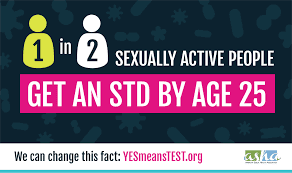Feminist Friday on the importance of sexual health and empowerment

Kay Switzer explained the importance of STI testing and how it relates to sexual health and empowerment.
October 16, 2020
This week’s Feminist Friday, presented by Kay Switzer, discussed the importance of sexual health and how to feel sexually empowered.
During her presentation, Switzer, an outreach coordinator for the Family Planning Council of Iowa (FPCI) and a sexual health activist, focused on the Title X program and how it is crucial to stay educated on and informed about your personal sexual and reproductive health.
“I think conversations like this sometimes are hard to have because … we want to feel accepted, and it’s hard to be vulnerable when talking about such sensitive topics,” Switzer said.
According to Swtizer, the Title X program, a federally funded grant program that provides free or low-cost reproductive health care to people based on income, is important to Iowans because you are able to have access to family planning and health services and sexual education.
Switzer then noted there are two organizations in Iowa that receive Title X funding, the FPCI and the Iowa Department of Public Health. These organizations then spread the funds between clinics throughout Iowa in hopes to provide as many people as possible with reproductive health care.
“Family planning isn’t just about pregnancy anymore,” Switzer said. “… It encompasses all sexual health.”
For example, while Title X funded clinics that provide pregnancy testing and many birth control options, they also provide services such as STI testing and treatment, pap smears, wellness exams and vaccinations.
“Once people become aware of this program and how it works, you can have access to these services,” Switzer said.
Switzer then gave a brief overview of the FPCI, which was established in 1980. According to Swtizer, FPCI’s mission is to provide quality reproductive health care and family planning services to all people in Iowa who desire such services. They accomplish this goal by providing STI testing and treatment services, continuing nursing education credits, encouraging conversations between caregivers and children about sexual health and, of course, providing Title X services.
Switzer then shifted the conversation to the importance of being educated on sexual health and feeling sexually empowered.
“Growing up is hard enough, and wanting answers to those awkward, sexual questions we had as teenagers, that was important,” Switzer said.
She noted that many children today are receiving misguided and false information about sexual health from friends and the internet. She also added that sex education classes don’t give enough information, and many family members are too embarrassed to discuss the topic of sexual health with their children.
“Those children become young adults, and many of them go off to college or the workforce believing all the myths that they were once told to be true,” Switzer said.
Switzer urges young people to educate themselves on sexual health and to confront what they were told as children. According to Switzer, it is up to you to learn and grow as you age; this includes taking power over your sexual health and identity.
“Feeling strong in your commitment to stay healthy in your sexuality is the first step to feeling empowered,” Switzer said. “You can be an advocate, a supportive partner and be a sexually liberated person while being mindful of your sexual health.”
She then provided seven tips to becoming sexually empowered. These tips include:
-
Embracing safer sex — It is important to be knowledgable on the possibility of becoming pregnant and contracting STIs.
-
Understanding your rights — You have the right to consent to each sexual activity you have and you do not owe anything to your partner.
-
Recognizing the power of choice — You don’t need to be sexually active in order to feel empowered.
-
Recognizing gender role stereotypes — It is important to challenge how society believes men and women should speak and act.
-
Owning your gender identity and sexual orientation — Fight back against gender stereotypes and be proud of who you are.
-
Forming your own beliefs on empowerment — Take time to consider what you find empowering, not what others think or say is empowering.
-
Always respecting yourself and remembering you’re worthy of other peoples’ respect.
Switzer concluded her presentation by reiterating the importance of Title X and its effect on sexual empowerment.
“… I hope today that you recognize that sexual empowerment comes from healthy sexual practice; it doesn’t matter what the orientation is,” Switzer said. “We get to be in charge of what our sexual health looks like.”
















